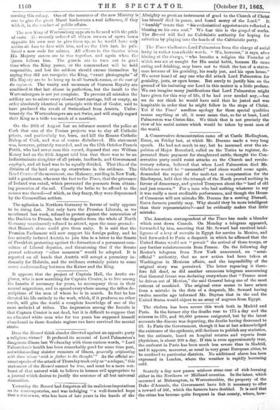levity in rather rem u.kable words. " We, however," it
says, after hinting at the charge, "who breathe a religion the Founder of which was sat at naught for His social habit, because He came eating and drinking, may learn not to think the less of a states- man because of his geniality, his ready jest, and his open house." We never heard of any one who did attack Lord Palmerston for geniality, jests, or open house. But surely to justify him on the 'ground of his imitating our Lord in this matter is a little profane. We can imagine many justifications that Lord Palmerston might have given for this way of life, if he had ever needed any,—but we do not think he would have said that he jested and was hospitable in order that he might follow in the steps of Christ. Yet if the Times' needless apology for these special qualities means anything at all, it must mean that, so far at least, Lord Palmerston was Christ-like. We think that is not precisely the view of his social nature which would be taken by most men of the world.






























 Previous page
Previous page